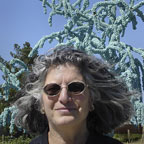About
Darcie Fohrman consults with museums of all types to create multidisciplinary, interactive exhibitions. Her clients include the Exploratorium, Bay Area Discovery Museum, Oakland Museum of California, California Academy of Sciences, Skirball Cultural Center, and the Getty Center.
Darcie’s award winning exhibitions include Daniel’s Story: Remember the Children at the United States Holocaust Memorial Museum in Washington, DC, Revealing Bodies at the Exploratorium in San Francisco; QUESTION at the Cantor Arts Center, Stanford University; and COURAGE: The Carolina Story That Changed America at the Levine Museum of the New South in Charlotte, North Carolina, which received the American Association of Museums Excellence in Exhibition Award and the American Association for State and Local History Award for Best Exhibition.
She brings 40 years of collaborative experience to her work as an interpretive planner, exhibition designer and developer, creative director, and project director. Prior to consulting, she was the director of exhibitions at the San Diego Museum of Art, where she introduced the team approach to exhibition development, designing large blockbuster exhibitions. Before that, she was the director of exhibitions at the Spertus Museum of Judaica in Chicago, where she designed the first permanent Holocaust exhibition in the United States.
Darcie believes in contributing to the profession of museum exhibition design. For eight years, she was on the faculty of the Museum Studies graduate program at John F. Kennedy University teaching Exhibition Development and Design and continues to teach university courses and participate in museum conferences. Also, she was a founding member, vice president, education chair, and program chair of the National Association for Museum Exhibition (NAME) and an Editorial Advisor of the journal. She co-organized three NAME Retreats exploring models for creativity and the collaborative process from outside the museum field. She is a member of The Museum Group, an association of independent museum consultants who formerly held administrative positions in-house, and Art Table, a national organization of women in leadership roles in the arts.
Many of Darcie’s projects are grounded in great stories, and she uses her formidable skills to partner with curators, developers and other content developers to crystallize the meaning and drama of these stories and translate them into the exhibition medium.
–Phyllis Rabineau, Deputy Director for Interpretation and Education
Chicago Historical Society
